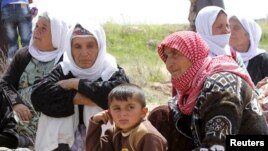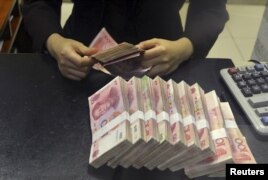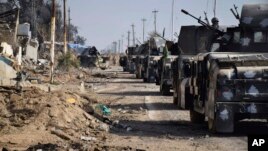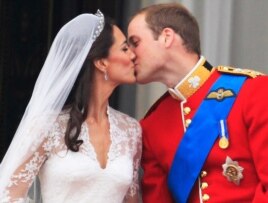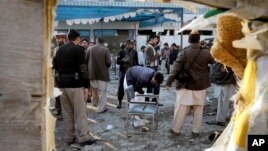04 January, 2016
Saudi Arabia, Bahrain and Sudan have cut off diplomatic relations with Iran.
On Saturday, Saudi Arabia executed a well-known Shi'ite Muslim leader. The cleric had publicly criticized the leaders of Saudi Arabia and Bahrain.
In response, angry demonstrators in Tehran attacked the Saudi embassy Saturday.
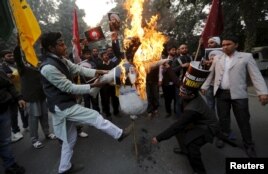
Shi'ite Muslims burn a representation of Saudi King Salman bin Abdulaziz during a protest against the execution in Saudi Arabia of cleric Nimr al-Nimr, in front of Saudi Arabia's embassy in New Delhi, India, Jan. 4, 2016.
The demonstrators set fire in the building, destroyed furniture and threw papers off the roof. At least 40 protesters were arrested.
Iranian President Hassan Rouhani called the attack "totally unjustifiable," but he criticized Saudi Arabia for executing the cleric, Sheikh Nimr al-Nimr.
Saudi Arabia executed 46 other prisoners on the same day as Nimr. It was the largest number of executions in one day in Saudi Arabia in 30 years.
Many countries protested the executions. Some critics threatened the Saudi royal family. Large protests have taken place since Saturday in many countries, including Bahrain, where police used tear gas on the protestors.
Demonstrations also took place in India and at the Saudi embassy in London.
Late Sunday, Saudi Foreign Minister Adel al-Jubeir ordered all Iranian diplomats to leave Saudi Arabia. He said "the continued attacks on diplomatic missions (are) a flagrant violation of all international treaties."
He said Saudi Arabia -- a Sunni-majority country -- would not let Shi'ite-led Iran weaken the security of Saudi Arabia or the Middle East. Sunnis and Shi'ites are Muslim groups.
"We want to make it very clear that there is no space in the community of nations for a country that condones terrorism, that supports terrorism and that engages in terrorism," he said.
Late Sunday, the Iranian state news agency reported comments from Iran's Deputy Foreign Minister. It said he criticized Saudi Arabia's decision to end diplomatic relations with his country. He said Saudi leaders were trying to move attention away from executing Sheikh Nimr al-Nimr.
On Monday, an Iranian Foreign Ministry spokesman said Iran was helping its diplomats leave Saudi Arabia. But he said none had left the country yet. He criticized Saudi Arabia for ending diplomatic relations with his country. He said Saudi Arabia is causing tension in the Middle East.
On Monday, Bahrain also ended diplomatic relations with Iran. Bahrain and Saudi Arabia are close allies. The state news service BNA reported Bahrain's government had ordered Iranian diplomats to leave the country within 48 hours.
Sudan also ended diplomatic relations with Iran on Monday. And the United Arab Emirates said it was ordering some Iranian diplomats to leave the country.
Sudan called the attack on the Saudi embassy in Tehran "barbaric." The UAE criticized what it called Iran's "continuous interference in the internal affairs of Gulf and Arab states, which has reached unprecedented levels."
Sunday, Iranian state television reported that Iran's Supreme Leader -- Ayatollah Ali Khamenei -- said Nimr did not urge "people into armed action," and did not plot against the Saudi government. He said "the only thing he did was utter public criticism rising from his religious zeal."
In a statement on Sunday, Iran's Revolutionary Guard said Nimr's execution would lead to the "downfall" of Saudi Arabia's monarchy. It called the execution a "medieval act of savagery."
Iraq's Grand Ayatollah Ali al-Sistani called the execution an "injustice" and an act of "aggression."
Nimr was found guilty of plotting against the state, and other charges, in 2014. He was one of the leaders of Shi'ite protests in eastern Saudi Arabia in 2011.
Human rights groups have for many years criticized Islamic courts in Saudi Arabia for sentencing people to death even for non-violent crimes. The groups say trials in Saudi Arabia are secretive and unfair.
U.N. Secretary-General Ban Ki-moon said he was "deeply dismayed" by the execution of Nimr and called for "calm and restraint in reaction" to the killings.
In a statement, the U.S. State Department said the Obama administration "will continue to urge leaders across the region to take affirmative steps to calm tensions." It also said the administration believes "diplomatic engagement and direct conversations remain essential" to ending the unrest.
The State Department said the execution of Nimr would add to the tensions between religious groups in the Middle East.
Iran and Saudi Arabia have been competing for leadership of Muslims since the 1979 revolution in Iran. Conservative Shi-ite Muslim religious leaders took power during that revolution.
I'm Mario Ritter.
VOA News Writer Chris Hannas reported this story from Washington. Christopher Jones-Cruise adapted it into VOA Learning English. Kathleen Struck was the editor.
We want to hear from you. Write to us in the Comments Section, or visit our 51VOA.COM.
_
Words in This Story
unjustifiable – adj. not able to be defended, excused or accepted; not justifiable
royal – adj. of or relating to a king or queen
tear gas – n. a gas that makes people unable to see by causing their eyes to be filled with tears and that is used especially by the police or military to separate large groups of people
mission – n. a place or building where diplomatic work is done; smaller than an embassy
flagrant – adj. very bad; too bad to be ignored
condone – v. to forgive or approve (something that is considered wrong); to allow (something that is considered wrong) to continue
barbaric – adj. very cruel
unprecedented – adj. not done or experienced before
befall – v. to happen to
utter – v. to say something
zeal – n. a strong feeling of interest and enthusiasm that makes someone very eager or determined to do something
downfall – n. a sudden loss of power, happiness, success, etc
monarchy – n. a form of government in which a country is ruled by a monarch
medieval – adj. informal or figurative very old; too old to be useful or acceptable; of or relating to the Middle Ages; of or relating to the period of European history from about A.D. 500 to about 1500
savagery – n. a cruel or violent act or action
dismayed – n. a strong feeling of being worried, disappointed or upset
region – n. a part of a country, of the world, etc., that is different or separate from other parts in some way
affirmative – adj. saying or showing that the answer is "yes" rather than "no"
engagement – n. the act or state of being involved with something; involvement
essential – adj. extremely important and necessary




